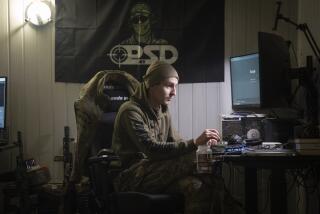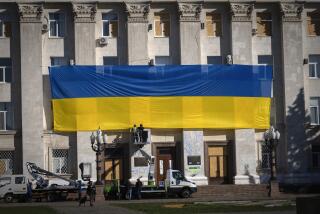Wrong-Way Troops Paint a Lost Cause in Chechnya
GROZNY, Russia — Grozny without a map?
In a military snafu bizarre even by Soviet standards, six Russian prisoners of war said they were captured after being sent on missions inside the breakaway republic of Chechnya and losing their way because their commanders had neglected to give them a map.
“We took a wrong turn,” said Lt. Nikolai Novikov, who said he was captured on New Year’s Day while wandering near Grozny, the Chechen capital whose name means terrible in Russian.
Novikov said he and three of his soldiers were captured after they were ordered to drive from Grozny to the Russian base in Mozdok, 66 miles over poorly marked roads, to pick up food for their tank battalion.
“We didn’t know where to go,” Novikov said. “We just got lost.”
The soldiers were quickly spotted by Chechens. One was killed in the ensuing firefight, and two others were seriously injured and sent to Chechen hospitals. Novikov suffered minor wounds to the head and hand and was taken prisoner.
All told, six Russian POWs blamed map shortages for their capture. Their disastrous lack of preparation for what has become a full-scale guerrilla war may be endemic to the entire post-Soviet army.
Its image already tarnished, the Russian military suffered a further blow Saturday when the general in charge of the thousands of Interior Ministry troops in Chechnya was killed by a mortar shell.
Maj. Gen. Viktor Vorobyov, the highest-ranking Russian officer to die in the conflict, was overseeing the creation of a new military headquarters at Grozny’s Oil Institute when the shell exploded near him, a Russian Interior Ministry spokesman said. Two other officers were seriously wounded.
Russian troops continued to pound the Chechen capital Saturday with intense shelling, setting the presidential palace ablaze once again but failing to wrest control of the city center from Chechen fighters.
*
The Russian POWs, allowed by their Chechen captors to speak to journalists, are becoming perhaps the most eloquent spokesmen against Moscow’s war in Chechnya.
The Chechen fighters “are not armed gangs, as we were told,” said Sr. Lt. Yuri Galkin, speaking calmly into television cameras and showing no apparent signs of duress. “It’s a people’s war. It is very difficult to fight a people. They are fighting for their land, and we are the occupiers here. And I’m ashamed that I look like a fascist.”
Galkin and the other POWs were being held in an apartment building about a mile from the presidential palace.
Chechen fighters stayed in the room while the prisoners were speaking to journalists, raising the possibility that they might be saying what their captors want to hear. But the young Russians seemed more angry at their commanders and their predicament than afraid of the Chechens.
“Our task was to seize the presidential palace and force (Chechen President Dzhokar M.) Dudayev and his government to disarm, to liberate the Chechen people, the way they told it to us,” said another prisoner, Lt. Nikolai Kolombed. “We can only envy the way they defend their land.”
Kolombed said he had believed the Russian officers who told him that to be captured by Chechens meant death. Having resisted integration into the Russian empire for centuries, the Chechens have a reputation as a wild people who are born fighters.
Chechens are widely disliked and feared by Muscovites, who believe they run the cruelest organized crime group in Russia.
“They said the (Chechens) would cut off our heads and there would be brutality,” said Kolombed, who was unconscious when he was captured after a failed Russian attempt to storm Grozny on New Year’s Eve.
“They’re treating us very humanely,” he said. “They don’t humiliate us. We’re not afraid now, as we were in battle.”
*
Russian critics of the war have blasted the Kremlin for sending green draftees into an urban battlefield that would daunt even experienced soldiers. The POWs described the pure terror of heading into combat without knowing where they were going.
“They’re fighting in their own city,” Lt. Dmitri Bondarev told CNN. “We came here, I didn’t know where the city was, what the streets were. We didn’t have a map. We drove and we could barely see anything out of the armored personnel carrier, and there were explosions all around us.”
Novikov said he was told his unit would be sent to Chechnya as peacekeepers.
“We were not prepared for war,” he said, adding that Russian troops have no business in Chechnya and should be withdrawn immediately.
The failure to provide soldiers with maps of Chechnya could be a holdover from Soviet times, when a good map was considered a military secret.
Closed military-industrial towns and anything considered a strategic target were simply omitted from civilian maps, and some were deliberately drawn wrong to confound spies and would-be attackers.
Nobody in Grozny appeared to have a good city map either. Russian commanders may simply not have seen the need to share such sensitive information with rank-and-file soldiers.
“It happens quite frequently,” said Jr. Sgt. Oleg Slashchov, 23, part of a unit of about 100 riot police from Stavropol who were stationed with regular army troops on Chechnya’s eastern border. “In fact, we didn’t know where we were going either. We just picked up the basics--ammunition--and off we went.”
Slashchov’s unit of police officers in their 20s, all of whom had already done a stint in the Russian army, appeared more cheerful and more purposeful than the young recruits serving alongside them.
*
They articulately defended the Russian military intervention in Chechnya, saying that Chechen bandits, gangsters, carjackers and even farm equipment thieves have long been preying on neighboring Stavropol and then running back into Chechnya, where Dudayev’s police would refuse to hand them over to the Russians.
After spending a month on the border trying to intercept weapons shipments heading for Grozny, the Russians were frustrated by the way Chechen fighters could attack them and then melt back into the civilian population with impunity.
“When a sniper is shooting, he’s a militant, but whenever he drops his gun, he’s a peaceful citizen,” Slashchov said bitterly.
The riot police said morale is not high among the young soldiers living alongside them in primitive dugouts, in constant cold and thick mud. One soldier deserted, they said. But they insisted that the Russian army would not give up so easily and would eventually prevail in Chechnya.
But in a sign of continuing discontent in the Russian army over the wisdom of the Kremlin’s war in Chechnya, the vaunted Pskov paratrooper division, which has been ordered in to back Russian troops planning another storm of Grozny, has refused to come, the riot police said.
“It’s direct disobedience, a dereliction of duty,” Slashchov said in disgust.
Most Russian troops have almost no access to newspapers, radio or television reports that have become aggressively critical of Russia’s bombing and shelling of civilians. But if they tune in, they are liable to get an earful from their captured comrades.
“This is simply a massacre, where innocent people are being killed on both sides,” said Sergei Zhukov, an 18-year-old captive who was released to his unit by the Chechens and then deserted to the republic of Dagestan because he sees the Russian campaign in Chechnya as immoral.
“The victims,” he said, “are innocent civilians, innocent Chechens defending themselves and innocent soldiers who do not understand why they have been moved here like chess pawns.”
More to Read
Sign up for Essential California
The most important California stories and recommendations in your inbox every morning.
You may occasionally receive promotional content from the Los Angeles Times.










